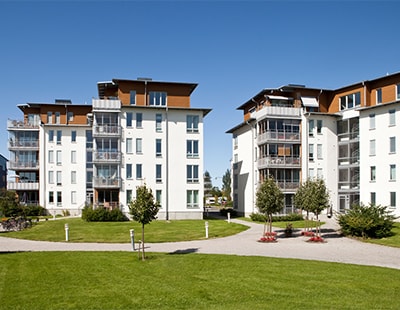The ethos behind BTR, we are told, is to build ‘community’ where tenants live in a lifestyle and not merely a rental unit. The US model, after all, famously attracts long-term loyalty with people choosing to rent for decades and moving from scheme-to-scheme run by the same operator, just as they remain dedicated to one car maker as they change model.
Yet there’s little sign of such loyalty in the UK so far. I know it’s early days for BTR but I’ve been unable to find case studies of renters moving from one scheme to another, dedicated to the lifestyle created by any particular operator.
Perhaps it’s because BTR doesn’t actually really present itself as a lifestyle, but more as an asset class - an investment which doesn’t bother to disguise itself as anything else.
Look, for example, at this week’s announcement of a new BTR scheme in Birmingham.
If this were a private housing estate being built by, say, Barrett Homes, the advance publicity would have been cheesy but at least homely. I would have received some soft-focus CGIs of the properties, the scheme would have a name which at least nodded towards a sense of locality, and there would be details of real, young, photogenic off-plan buyers.
Instead, this was the first paragraph of the announcement that came to my inbox about a BTR scheme: “Harrison Street, one of the leading investment management firms exclusively focused on alternative real assets, together with its joint venture partner, Cortland, a multifamily real estate investment, development and management company, today announced the development of a 440-unit build-to-rent property in Birmingham, UK.”
Oh, and the name of this new 44-unit scheme? Something soft and cuddly, perhaps? Or named after a local NHS hero?
No - the BTR scheme is to be called ‘Cortland Broad St.’ Yes, that’s right - this Birmingham ‘community’ is named after a company based in Atlanta that describes itself as “a vertically integrated, multifamily real estate investment, development and management company fo-cused on delivering resident-centric, hospitality-driven apartment living experiences.”
I would point out this is in no way unique - and I am not having a pop at the companies behind this scheme. Cortland Broad St sounds terrific with a gym, cinema room, co-working space, resident lounges, private dining area and roof terrace. It’s just that it’s presented first and foremost as a financial exercise, not an array of wonderful homes.
So many new BTR schemes are presented in this impersonal, we’re-just-here-to-make-money tone: they could be about microchips or ovenchips, and they certainly don’t come across as if they are about anything homely.
Although Britain’s residential developers have proven themselves to be money-making-machines too, they at least dignify their activity by recognising they provide homes for real people. They try to get involved in local good causes and launch their schemes with the mood music that they are creating communities as well as providing cash for shareholders.
Estate agents too, are selling assets - but agents seize every opportunity to present themselves as parts of a community, to show off their local knowledge and that they care.
My point is this. We need Build To Rent and, personally, I am sure it has the potential to provide good quality housing with high-spec facilities, becoming a valuable part of the renting landscape in the UK.
But to win the hearts as well as the minds of property professionals and the public, there needs to be a genuine effort to talk about homes and not just assets; to make it seem that the sector is about the people who live in these units as well as the rent revenue.
Private landlords hope to make a profit but often say they provide a public service, too, by providing homes to people who cannot afford to buy, and if you speak with many landlords it’s clearly the case that most believe this very sincerely.
If that’s the case, why can’t large multi-national BTR operators with chunky PR budgets come across as if they care about people as well as profits? Without that Build To Rent will remain on the fringes - the cold, impersonal fringes - of this country’s rental sector.
*Editor of Estate Agent Today, Letting Agent Today and Landlord Today, Graham can be found tweeting about all things property at @PropertyJourn











.png)


.png)



Join the conversation
Jump to latest comment and add your reply
The implication that individual landlords care any more about their tenants is extremely amusing. You try to prevent more competition from more efficient providers. Is that because you care so much about your tenants rather than because they might perhaps slow the rate of increase of rent or even reduce the rent you can charge?
Are you seriuosly so deluded that you think American corporations entering the UK build to rent market are going to slow the rate of rent increases?? 😂Jesus Christ, try some objectivity.
Property is like any other business. Happy customers equal profits. Happy tenants equal profitable properties. Good landlords know this and act accordingly. That is the extent of their obligation to 'care'. If you want someone to care about you, go talk to your Mother.
Please login to comment